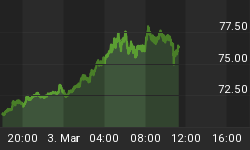Below is an extract from a commentary originally posted at www.speculative-investor.com on 17th January 2006.
China 's State Administration of Foreign Exchange recently said that one of its targets for 2006 was to "improve the operation and management of foreign exchange reserves and to actively explore more effective ways to utilise reserve assets". This statement generated a great deal of discussion about the possibility of China selling some of its US$-denominated reserves and increasing its gold reserves, actions that would potentially have huge impacts on the currency, bond and gold markets given the enormity of China's US$ reserves.
China presently holds about US$800B of foreign currency reserves -- most of it US$-denominated -- and is likely to have at least one trillion dollars of reserves by this time next year. In comparison, the combined total of gold reserves reported by the world's central banks is around 30,000 tonnes, or US$530B of gold at the current gold price. Note, though, that about half of this gold has probably been loaned or swapped in order to generate income and/or keep a lid on the gold price, so the actual amount of physical gold in the vaults of the world's central banks might only be in the vicinity of 15,000 tonnes (US$265B worth of gold at the current gold price). In other words, if China's Government decided to make a shift in the way its reserves were allocated such that in 12 months time 25% of its reserves were gold, the amount of gold it would need to purchase would be equivalent to the sum total of all the gold currently held in the vaults of the world's central banks. Furthermore, even if China decided to convert only 5% of its dollar-denominated reserves into gold it would need to purchase the equivalent of one year of the world's total mine supply.
Obviously, if China attempted to shift only a small portion of its reserves from dollars to gold the effect on the gold price would be substantial to say the least. In fact, if China were to go into the market and convert 5% of its current foreign exchange reserves into gold it would probably have the effect of doubling or tripling the gold price. This, quite naturally, is a possibility that excites many gold bulls.
However, the dramatic effect on the gold price that would be caused by China making even a small shift out of dollars and into gold all but eliminates the possibility of such a shift taking place. If China held a lot less dollars and there was a lot more gold in the world then shifting reserves from dollars to gold might be feasible, but as things currently stand it's really not an option.
At this stage inflation fears remain surprisingly low, thus supporting a high average price/earnings ratio in the US stock market and low bond yields throughout the world, but the sort of gain in the gold price that would result from large-scale official-sector buying on the part of China would change everything. Bond yields would soar, stock prices would tank, and the US economy would plunge into recession. Knock-on effects would include a large reduction in the amount of Chinese goods purchased by US consumers, a recession and burgeoning unemployment in China, and, quite possibly, enough social unrest in China to threaten the survival of the current leadership.
What needs to be understood is that ALL of the world's central banks and governments have a vested interest in keeping the current monetary system going because it's a system that allows them to get something for nothing. As long as the vast majority of people have confidence in today's paper money, that is, as long as most people expect the money they use every day to do nothing worse than lose its purchasing power at the rate of 2%-4% per year, then the system will be viable and governments will be able to pay for their growth by creating money out of thin air.
The bottom line is that there are many good reasons to expect the gold price to move much higher over the next few years, but the buying of gold by China's Government is not one of them. And by the way, if China's Government ever did decide to break ranks and convert a meaningful portion of its US$ position into gold it would not publicise its intention.
















